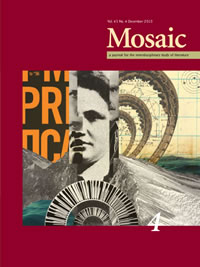Issue 43.4
Overview

General Issue
Published: December 2010
View the issue introduction or see the issue summary and contents below.
10 essays, totalling 192 pages
$19.95 CAD
This is an issue of wonderful collaborations and juxtapositions. Look for essays that explore unexpected literary and critical hinges: that read Salman Rushdie together with Jean-Luc Nancy, William Faulkner with space theory, Gertrude Stein with Alfred North Whitehead, Jean Rhys with Tayeb Salih, Lawrence Durrell with Henri Bergson, and eighteenth-century novels with contemporary video games. Writing is figured as an Orphic journey in the poetry of the Iraqi Assyrian exile Sargon Boulus. White Americans’ ideas about blackness in the 1970s and 1980s are approached through Raymond Carver’s incorporation of African American characters in his short stories. Elizabeth Moon’s novel about autism is read against contemporary cognitive science. And theories of cultural hybridity are brought to a reading of Diana Abu-Jaber’s Arabian Jazz.
The Stein Differential: Gertrude Stein’s Mathematical AestheticAnn Hoff This essay argues that Stein adopted a mathematical aesthetic influenced by Alfred North Whitehead. Her turn away from James’s influence towards Whitehead’s signifies a feminist defiance of patriarchy, and “Patriarchal Poetry” is the resultant anti-narrative, feminist experiment in replacing patriarchal grammar with a mathematical, genderless, and abstract mode of writing. | |
Metaphor and Madness as Postcolonial Sites in Novels by Jean Rhys and Tayeb SalihPaul Huebener Rhys’s novel Wide Sargasso Sea and Salih’s Season of Migration to the North use metaphor and madness as sites for witnessing and responding to colonialism. Striking similarities ultimately give way to contrasting portrayals of the potential for individual agency and personal relationships to mend colonialism’s violent social disconnections. | |
Autism and Modular Minds in Elizabeth Moon’s The Speed of DarkStephen Dougherty The classical cognitive scientific model of autism purports to explain why we are social creatures. Yet it has attempted to do so through varieties of the mind-as-computer analogy, which undermines the model’s ability to carry out its analyses of society. I investigate this problematic through the lens of Elizabeth Moon’s novel about autism, The Speed of Dark. | |
A Place that is Other: Ethos of Groundlessness in Rushdie’s The Ground Beneath Her FeetChun-yen Chen Today’s heavily spatialized globalization theory tends to conceptualize selfhood in a positivist way, suggesting concretized relations between the self and a locale. Rushdie’s The Ground Beneath Her Feet entertains a non-positivist approach to globalization by configuring individuals as singular beings rather than particularized microcosms of a generality. | |
Diana Abu-Jaber’s Arabian Jazz: Hybridizing Arab-American Feminism and LiteratureNayef Ali Al-Joulan This essay argues that Diana Abu-Jaber uses mainstream feminist strategies in dealing with patriarchal stereotypes of women and, simultaneously, deviates from mainstream feminist theory. Approached according to theories of cultural hybridity, this dual stance is seen as a hybridizing Arab American feminist attitude which represents a mezzaterra, or borderland of cultural intersection. | |
Racial Imaginings in Raymond Carver’s Short Stories and in American CultureVanessa Hall This essay analyzes Carver’s incorporation of African American characters into his short stories. Considering moments of black and white interaction in Carver’s stories both enables a fuller understanding of the function of race in his writing and provides an examination of the many ways discourses of race shaped by white Americans’ ideas about blackness were embedded in 1970s and 1980s America. | |
“The Reader of the Book”: A Reflection on Reading PoetryEfrat Bloom “The Reader of the Book,” a poem by the Iraqi Assyrian exile poet Sargon Boulus (born al-Habbānīyah, 1944; died Berlin, 2007), figures writing as an Orphic journey and reading as a looking back that casts the text into the irrevocable distance of the written. | |
Between Physics and Metaphysics: Spenglerian Bergsonism in Durrell’s Revolt of AphroditeJames M. Clawson Recent scholarship offers convincing reasoning for reconsidering Lawrence Durrell’s understudied The Revolt of Aphrodite. Despite Durrell’s declared affinities for Oswald Spengler, this essay argues that Henri Bergson offers a clearer lens through which to read the work, thus connecting the work with modernist forebears. | |
Sinners in the Temple: Transgressions of Social Space in SanctuaryDavid A. Davis William Faulkner’s novel Sanctuary focuses on a series of transgressions involving reputable and disreputable spaces. This essay uses space theory to examine how space is constructed and transgressed in the novel, how space relates to character, and how space is ultimately based on socially-constructed illusions. | |
Reflexivity as Entertainment: Early Novels and Recent Video GamesChristina Lupton and Peter McDonald This essay compares self-reflexive devices in eighteenth century novels and contemporary video games. This comparison suggests a long history of popular entertainment that draws attention to its own mediation while challenging the more radical forms of self-consciousness that theorists have associated with anti-mimetic forms of narrative. |